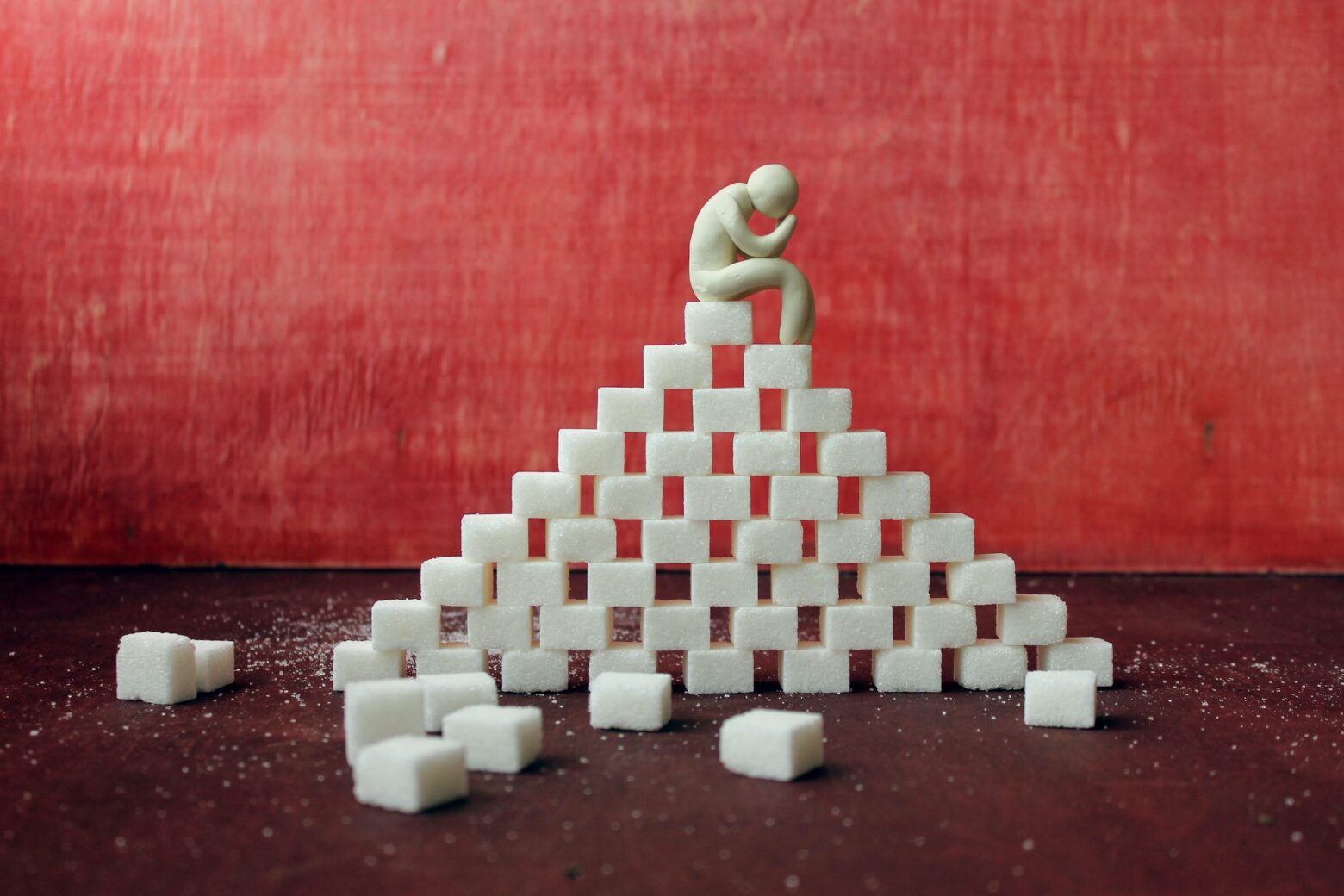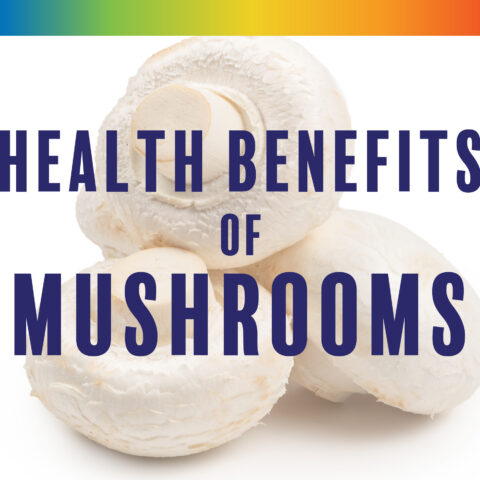The Relationship Between Sugar and Mental Health

Imagine this: It’s early evening. You’ve just stepped through the door after a whirlwind of responsibilities: meetings, errands, traffic, pickups, drop-offs, and a to-do list that never quite shrinks.
Exhausted, you toss your bag on the counter, kick off your shoes, and reach for something that will give you a moment of relief. Your hand lands on a chocolate bar, a cookie, or maybe that leftover holiday candy. You take a bite, and a wave of satisfaction instantly washes over you. The sweetness soothes the stress and, for a moment, all feels right in the world.
But then, an hour later, the crash hits. Your energy plummets, your mood shifts, and suddenly, that initial comfort is replaced by sluggishness, irritability, or brain fog. You wonder, “Why do I feel worse than before?”
This isn’t just in your head; it’s a physiological and psychological reaction to sugar’s effects on the brain and body. It’s something many of us have experienced time and time again, while often admonishing ourselves for our cravings. Sugar’s less-than-ideal effects don’t just stop at one’s waistline or dental health, it can have profound impacts on our mental wellness. And the more we understand these effects, the more power we have to break free from the cycle.
Not All Sugar Is Created Equal
Sugar is often lumped into a single category, but in reality, not all sugars behave the same way in the body. The type of sugar we consume makes a crucial difference in how it impacts our mental and physical health.
Natural Sugars
These are found in whole foods like fruits, dairy, and vegetables. Because these sugars are found in whole foods, they are therefore paired with fiber, vitamins, minerals, and phytochemicals which cause them to be digested more slowly, providing a steady release of energy and reducing drastic blood sugar swings.1
For example, eating a whole apple (which contains natural sugars like fructose and glucose) leads to a much more stable blood sugar response compared to drinking apple juice, where the fiber has been stripped away.
Added Sugars
These are isolated forms of sugar incorporated into foods and drinks during processing. This category includes table sugar (sucrose) and high-fructose corn syrup (HFCS), which are rapidly absorbed into the bloodstream, causing sharp increases in blood sugar and insulin levels. This sudden surge often leads to a “crash,” where blood sugar levels drop, leaving people feeling fatigued, irritable, or craving more sugar.2
RELATED: Are Natural Sweeteners Paleo?
Sugar Alcohols
Found in sugar-free gum, candies, and diet foods, sugar alcohols such as xylitol, erythritol, and sorbitol are only partially absorbed by the body.3 They have a lower glycemic impact than regular sugar, making them a popular choice for people with diabetes or those trying to avoid blood sugar spikes. However, excessive consumption can lead to bloating, gas, and digestive discomfort due to fermentation in the gut.
Artificial Sweeteners
These chemically synthesized sugar substitutes, including aspartame, saccharin, and sucralose, are designed to provide sweetness without the calories. While they don’t raise blood sugar levels, emerging (and often conflicting) research suggests they may disrupt gut bacteria,4 which can, in turn, affect neurotransmitter balance and mood regulation. Some studies even suggest that regular consumption may increase cravings for sweet foods over time,5 contributing to a cycle of overconsumption.
RELATED: Naturally & Artificially Sweetened Beverages Are Associated with Dementia and Alzheimer’s
The Brain on Sugar: A Rollercoaster Ride
When sugar enters the bloodstream, the pancreas releases insulin to help regulate blood glucose. Added sugars, particularly refined sugars and HFCS, cause rapid glucose spikes, followed by sharp drops, which lead to fatigue, irritability, and cravings. Natural sugars, due to their fiber and nutrient content, tend to provide a more sustained energy source without these fluctuations, which usually helps to decrease or even eliminate crashing.
Sugar also impacts brain chemistry by altering dopamine levels. Dopamine is a neurotransmitter that controls pleasure and motivation. When we consume sugar, dopamine is released, reinforcing the desire to consume more.
Over time, excessive sugar consumption can desensitize dopamine receptors, leading to a reduced ability to experience pleasure from natural sources like exercise or nutritious foods.2 This is often why we may have an apple sitting on the counter, but have a negative reaction to it when we’re in the craving state. Subconsciously we are registering that the apple will not provide the same sense of euphoria or release that a high-sugar food will cause because of this dopamine mechanism.
This mechanism is useful to understand because it also allows us to become aware of this little trick the mind can play on us, and it gives us the rationale to make a healthier snack choice. Additionally, like all behaviors, once we learn to check in with ourselves, we will find it easier and easier to not get swept up in the rush of satisfying a craving.
What to Expect When Cutting Back on Sugar
Reducing sugar intake can bring significant improvements in mental clarity and emotional stability, but the transition can be challenging. As dopamine levels adjust, temporary mood disturbances such as irritability and mood swings may arise. Fatigue and headaches are common as the body adapts to more stable blood sugar levels, and preliminary evidence suggests intense cravings may occur as sugar withdrawal mimics addictive patterns in the brain.6
Additionally, those who frequently consume sugar alcohols may notice digestive changes, with symptoms like bloating or diarrhea decreasing over time. These withdrawal symptoms typically last for a few weeks as the body stabilizes and adapts to a lower-sugar diet.
A Sustainable Approach to Finding Balance
Eliminating sugar entirely isn’t necessary, but managing intake can have lasting benefits for mental and physical well-being.
- Choose whole foods over processed options to help stabilize blood sugar and prevent energy crashes.
- Limit sugar alcohol intake to potentially reduce digestive discomfort.
- Use natural sweeteners like honey or maple syrup in moderation to offer a more balanced alternative.
- Eat meals rich in protein, fiber, and healthy fats to promote steady energy levels and curb the intensity of sugar cravings.
- Stay hydrated to help reduce unnecessary sugar cravings.
- Identify emotional eating triggers and practice awareness strategies that can help aid in avoiding using sugar for stress relief.
By making informed choices, we can break the cycles that impact our mental health and enjoy the sweetness of making empowered choices that help us mind, body, and soul.
References
- Abdi SAH, Abdi SIA, Ali MH, Balani NA, Balani NA, Jacob HL, Seyfi A, Al Shabout GH, Hamza DN, Al-Talabani AD, Khan R. Effects of Dietary Fiber Interventions on Glycemic Control and Weight Management in Diabetes: A Systematic Review of Randomized Controlled Trials. Cureus. 2025 Feb 4;17(2):e78497. doi: 10.7759/cureus.78497. PMID: 40051945; PMCID: PMC11884502. https://pubmed.ncbi.nlm.nih.gov/40051945/
- Freeman, C. R., Zehra, A., Ramirez, V., Wiers, C. E., Volkow, N. D., & Wang, G. J. (2018). Impact of sugar on the body, brain, and behavior. Frontiers in bioscience (Landmark edition), 23(12), 2255–2266. https://pubmed.ncbi.nlm.nih.gov/29772560/
- Hattori K, Akiyama M, Seki N, Yakabe K, Hase K, Kim YG. Gut Microbiota Prevents Sugar Alcohol-Induced Diarrhea. Nutrients. 2021 Jun 12;13(6):2029. doi: 10.3390/nu13062029. PMID: 34204751; PMCID: PMC8231616. https://pubmed.ncbi.nlm.nih.gov/34204751/
- Conz, A., Salmona, M., & Diomede, L. (2023). Effect of Non-Nutritive Sweeteners on the Gut Microbiota. Nutrients, 15(8), 1869. https://pubmed.ncbi.nlm.nih.gov/37111090/
- VYang Q. (2010). Gain weight by “going diet?” Artificial sweeteners and the neurobiology of sugar cravings: Neuroscience 2010. The Yale journal of biology and medicine, 83(2), 101–108. https://pubmed.ncbi.nlm.nih.gov/20589192/




